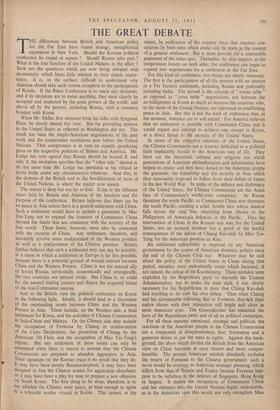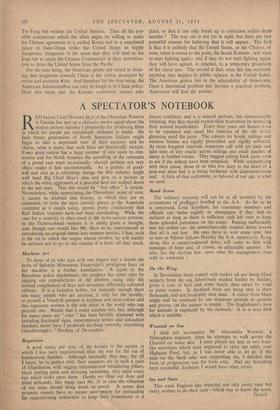THE GREAT DEBATE
THE differences between British and American policy for the Far East have found strange, metaphorical expression in New York. Should the Korean political conference be round or square ? Should Russia take part ? What is the true function of the United Nations in the affair ? Such are the questions which are now being debated with antaintensity which bears little relation to their simple impor- tance. It is, on the surface, difficult to understand why America should take such violent exception to the participation of Russia. If the Peace Conference is to reach any decisions, and if its decisions are to mean anything, they must clearly be accepted and respected by the great powers of the world; and above all by the powers, including Russia, with a common frontier with Korea.
When Mr. Dulles first returned from his talks with Syngman Rhee, he clearly shared this view. But the prevailing opinion in the United States as reflected in Washington did not. The result has been the Anglo-American negotiations of the past week and the compromise resolutions now before the United Nations. That compromise is in turn an equally perplexing gloss on the respective positions of Britain and America. Mr. Lodge has now agreed that Russia should be invited if, and only if, the invitation specifies 'that the " other side " desires it. At the same time Mr. Lodge has persisted in his refusal to invite India under any circumstances whatever. And that, to the distress of the British and to the bewilderment of most of the United Nations, is where the matter now stands.
The reason is deep but not far to find. It lies in the different views held by Britain and America of the function and the purpose of the conference. Britain believes that there can be no peace in Asia unless there is a general settlement with China. Such a settlement would have to include a guarantee by Mao Tse-Tung not to expand the frontiers of Communist China beyond the limits that are consistent with the security of the free world. These limits, however, must also be consistent with the security of China. Any settlement, therefore, will inevitably involve some readjustment Of the Western position as well as a readjustment of the Chinese position. Britain further believes that such a settlement may ope day be possible, in a sense in which a settlement in Europe is far less possible, because there is a potential ground of mutual interest between China and the Western Powers. China is not the natural ally of Soviet Russia; territorially, economically and strategically, the two countries are natural rivals. But China is, or could be, the natural trading partner and thence the acquired friend of the non-Communist nations.
And so the British view the political conference on Korea in the following light. Ideally, it should lead to a discussion of the outstanding issues between China and the Western Powers in Asia. These include, on the Western side, a final settlement for Korea, and the activities of Chinese Communism in Indo-China and Malaya. On the Chinese side they include the occupation of Formosa by Chiang in contravention of the Cairo Declaration, the protection of Chiang by the American 7th Fleet, and the recognition of Mao Tse-Tung's regime. But any settlement of these issues can only be attempted when there is reason to assume that the Chinese Communists are prepared to abandon aggression in Asia. Their signature on the Korean truce is no proof that they do. It may have been merely Russian-inspired; it may have been designed to free the Chinese armies for aggression elsewhere; or it may have been a play for time to prepare a new offensive on South Korea. The first thing to be done, therefore, is to see whether the Chinese want peace, at least enough to agree to a tolerable modus vivendi in Korea. This cannot, at the outset, be unification of the country since that requires con- cessions by both sides which could only be made in the context of a general settlement. But it must provide for a reasonable guarantee of the status quo. Thereafter, by slow degrees, as the temperature lowers on both sides, the conference can begin to expand into negotiations for a settlement in the Far East.
For this kind of conference, two things are clearly necessary. The first is the participation of all the powers with an interest in a Far Eastern settlement, including Russia and preferably including India. The second is the concept of " round table " as opposed to " cross table " negotiations, not between the ex-belligerents in Korea as much as between the countries who, in the name of the United Nations, are interested in establishing peace in Asia. But this is not the kind of conference that, at the moment, America can or will attend. For America believes that no settlement is possible with Communist China and it would regard any attempt to achieve one, except in Korea, as a direct threat to the security of the United States.
In terms of the collective emotions of the United States, the Chinese Communists are a tyranny dedicated to a political faith implacably hostile to the American way of life. They have cut the historical, cultural and religious ties which generations of American philanthropists and missionaries have helped to create; and they have denied to the American people the gratitude, the friendship and the security in Asia which they reasonably expected to follow from their defeat of Japan in the last World War. In terms of the defence and diplomacy of the United States, the Chinese Communists are the Asian face of Communism's world-wide conspiracy. As Russia threatens the north Pacific, so Communist China now threatens the south Pacific, creating a solid, hostile bloc whose shadow falls across the vital 'line, stretching from Alaska to the Philippines, of America's defences in the' Pacific. Thus the intervention of China in the Korean war was, for the United States, not an isolated incident but a proof of the fearful consequences of the defeat of Chiang Kai-shek by Mao Tse- Tung for the American position in Asia.
An additional inflexibility is imposed on any American government by the course of, American domestic politics since the end of the Chinese Civil war. Whatever may be said about the policy of the United States in China during that period, mistakes were undoubtedly made which hastened, if not caused, the defeat of the Kuomintang. These mistakes were exploited by the Republican party to discredit the Truman Administration; but to make the mud stick, it was clearly necessary for the Republicans to deny that Chiang Kai-shek had anything to do with his own defeat. Thus when Chiang and his disreputable following fled to Formosa, therieft their native shores with their reputation still bright and clean in most American eyes. The Generalissimo has remained the hero of the Republican party and of all its political campaigns.
For all these reasons, emotional, strategic and political, the, reactions of the American people to the Chinese Communists are a compound of disappointment, fear, frustration and a generous desire to put the mess to rights. Against this back- ground, the abyss which divides the British from the American view on China becomes at once clearer and more compre- hensible. The present American attitude absolutely excludes the return of Formosa to the Chinese government; such a • move would be contrary to American strategic planning, which differs from that of Britain and France because Formosa hap- pens to be valueless in the defence of Singapore, Hong Kong or Saigon. It makes the recognition of Communist China and her entrance into the United Nations highly undesirable. as in the American view this would not only strengthen Mao Tse-Tung but weaken the United Nations. Thus all the pos- sible concessions which the allies might be willing to make for Chinese agreement to a unified Korea and to a negotiated peace in Indo-China strike the United States as highly dangerous; dangerous in the sense that they will tend in the long run to assist the Chinese Communists in their determina- tion to drive the United States from the Pacific.
For the time being, the American people are united in think- ing that toughness towards China is the course prompted by virtue and necessity ..t..!ike. And therefore for the time being, the American Administraton can only be tough in its China policy. Does this mean that the Korean conference cannot take place, or that it can only break up in confusion within three months ? The way out is not yet in sight, but there are two powerful reasons for believing that it will appear. The first is that it is unlikely that the United States, or the Chinese, or even, when it comes to the point, the South Koreans , will want to start fighting again: and if they do not start fighting again, they will have agreed, in practice, to a temporary projection of the status quo. The second is that, once this has occurred, anything may happen to public opinion in the United States. The American genius lies in the adaptability of Americans. Once a theoretical problem has become a practical problem, Americans will find the answer.



























 Previous page
Previous page